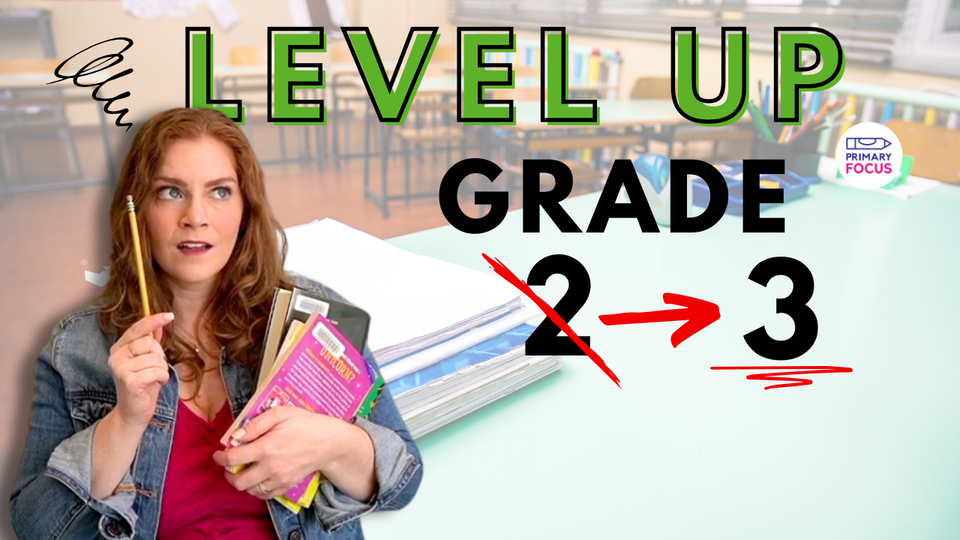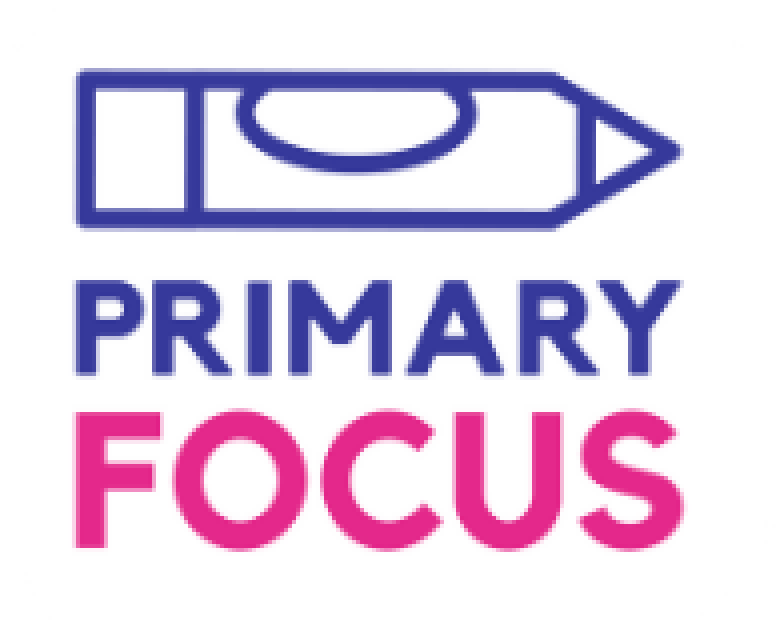
🎒 3rd Grade: Time to Level Up! Third grade is a big transition—academics shift, independence grows, and expectations rise! This is when kids go from learning to read to reading to learn, and math steps up with multiplication and division. So, how can you help your child thrive? Let’s talk about the must-know tips for 3rd grade success!
🎯 In this video, you'll learn:
✔️ How to to your child to love reading and important comprehension questions
✔️ Why skip counting is key for multiplication & math success
✔️ How to encourage independence and responsibility at home
✔️ Supporting emotional growth during this big transition
✔️ The best ways to communicate with teachers
Thank you to Katherine Akin for support with this video!
This video is great for parents of current second graders and rising 3rd graders, current third graders, and parents looking back to review skills
🖍️ Get Your Free Parent Teacher Conference Checklist: https://primaryfocus.tv/free-download-parent-teacher-conference-checklist/
🔹 3rd Grade Book Recommendations (affiliate links):
⭐️ TOP REC: Yardsticks by Chip Wood: https://urlgeni.us/amzn/yardsticks
📖 The One and Only Ivan (book 1 of 4) – Katherine Applegate: https://urlgeni.us/amzn/The_One_And_Only_Series
📖 Unicorn Academy Series - Julie Sykes: https://urlgeni.us/amzn/Unicorn_Academy
📖 Geronimo Stilton Series – Elisabetta Dami: https://urlgeni.us/amzn/Geronimo_Stilton_Series
📖 Dyamonde Daniels Series - Nikki Grimes:https://urlgeni.us/amzn/Dyamonde_Daniels_Series
📖 Because of Winn-Dixie – Kate DiCamillo: https://urlgeni.us/amzn/winn_dixie_book
📖 I Survived Series – Lauren Tarshis: https://urlgeni.us/amzn/I_Survived_Series
📖 Who Was/Is Series – Various authors: https://urlgeni.us/amzn/who_is_was_series
Website Recs:
Greg Tang Games: https://tangmath.com/games
Greg Tang Multiplication Riddles: https://tangmath.com/thebestoftimes
Let’s make this year a great one! 🚀
Video Transcript
It might feel strange to go send your eight or nine year old to go have a conversation with their teacher about their performance in math, but this is so good for their self esteem.
Hey, it's Natalie, and welcome back to Primary Focus, the parent's guide to elementary school. I'm so glad that you're watching today. Let's dive into the world of third grade.
We are talking about kids that are eight to nine years old. Third grade is a very interesting year because this is when things really start to change. If you've got a rising third grader, a kiddo that's going through the grade right now, or maybe your child's older and you're looking back to see how you can strengthen skills, this video is for you.
often designed as the grade where we shift from learning to read to reading to learn. By this age, children on grade level will begin to read in order to gain knowledge, instead of focusing just on practicing phonics, decoding, and sight words.
This is where the fun really starts to happen. If you have ever felt bored, bored during story time or like your child takes forever to read a book, this is the part where you can start to dive in, read more interesting books, revisit chapter books that you probably loved when you were a kid, and just explore the world in a completely new way.
Third graders are amazing because even though they are still little and they're still sweet, they are capable of so much more than they were ever before.
As we go through today, I want to give a special thank you to the third grade teachers that helped me and I definitely want to point you in the direction of the book Yardsticks by Chip Wood. This is an incredible book that, if you only buy one resource as a parent from my page, you should buy Yardsticks.
It is child development from age four. to 14 and every single year of your child's life, it breaks it down, gives you the answers of what they should be able to do at school, how they should be acting at home, translations of when they're acting a little bit moody, what they actually mean and more.
I've got five tips for you if you're a parent caretaker of a sweet little third grader. Number one, let's focus in on fostering a love for reading. Reading is one of the biggest parts of your child's academic career from here on out. You will see a major shift in third grade it's not just about reading during reading class, you will also see See that history and science will be reading comprehension based.
There'll be reading articles to learn new things and even math problems become word problems almost exclusively . Reading is so important. And so we want your child to love reading as much as they can. The good news for you is this starts at home \ there are a lot of tricks that you can do to help your child love reading.
The number one is to read with your child every day. I'm going to say that again, read with them every single day. Reading with your child should be like brushing your teeth. It's something that you don't skip.
It's so important. Build in that time whenever it makes sense. Maybe you have a late start school and you can read together in the morning. Maybe it's bedtime. Maybe it's directly when they get home from school. Maybe it's you get to practice early and you read in the car together.
Read, read, read, read, read. This is the age where a lot of parents stop reading with their children and they move into independent reading time only. They trust their child to be going through the chapter book. You should be reading together. This can look a lot of different ways. You could both be reading quietly side by side.
You could be reading aloud to them. They could be reading aloud to you. You could be reading and listening to an audiobook. Stamina is a really big thing. Your child will build up reading tolerance to 30 minute stretches at this age, and possibly even more.
in order to build that stamina, you want to give your child choice in what they're reading. Student choice matters. Think about when you go shopping for clothes or you're scrolling around on your streaming app and you're picking something. You're going to be much more interested in the things that you actually got to pick out yourself.
So don't worry if your child is only reading one genre of book. Hey, if they're obsessed with a series or they only want to read science fiction, that's totally fine. They will be exposed to so many more genres when they're in school.
This is also true for books that are too easy for your child. Let them read what they want for now and talk to the teacher directly. If you feel like you're concerned, they're not able to read more difficult books, but you know. so long as they're reading, for the most part, it's not a sign for concern.
Now, if your child is reading books that are way too difficult for them, whether they admit it or not, I would try to read that book together when you have free time on nights or weekends. Let them indulge in these hard books, but make sure that they're actually taking them in, and this is a great chance to actually build your connection together as well.
When you ask a child about a book, they should be able to tell you more than just the blurb on the back or a quick summary. They should be able to get into it and let you know what's actually happening, and it shouldn't just be from looking at pictures. You can figure out if they're understanding by asking these comprehension questions, which are also just good to ask in general to help them understand what's going on.
So you might want to ask them things like what problem or challenge does the main character have and how are they trying to solve it? What is your favorite part of the story so far and why? And if you could give advice to a character right now, what would you say and why? And I love the advice question, because this can spill over into real life too.
So if you want to start having some conversations with your child, but maybe they're a little private about their own life, or they don't open up that much, this can be a great door into understanding how they think about things. Now you know I love books, so I picked out a couple of recommendations for you.
I want you to notice as I go through these, these are all chapter books. They are heavy reading. The One and Only Ivan by Catherine Applegate. the Unicorn Academy series. These books are so cute
best part is there's a series, there are several of these books. If you have a child that loves a graphic novel, you certainly want to show them the world of Geronimo Stilton. These books are hilarious and they are almost like a graphic novel.
They're very colorful, what I really like about this is on the pages, they actually decorate the words
they have a lot of fun with making them different fonts, colorful, bolding the words. If your child is into writing stories, this would be a great novel because I think they'd get a lot of different ideas about how to make their own stories more exciting. This series comes up again and again. It's the Diamond Daniel series.
The goal here is to get your child hooked on a series.
And then some non fiction books. I love non fiction for K 2 because they're colorful and they're exciting. but it's hard when you see kids transitioning because the books can become so boring or it can be really hard to understand if the book is going to be at your child's level. I often feel this frustration when I'm tutoring because I want the children to read non fiction but the vocabulary can jump so high even if it looks like it's something that would be approachable.
So this isn't quite nonfiction, but I love these series and they are the I survived series. So here I have, I survived the Great Alaska Earthquake 1964 I survived the Galveston Earthquake in 1900. typically the character is a boy, they are living their life in that time period.
and then they survive. the experience and talk about what it's like. There's a historical section in the back of each book with timelines and information so your child can get into it. There are so many in the series that you can probably find one that is regional to your area.
My last recommendations are the Who Is and Who Was series. These are biographies they really have a wide range. So here I have Who Is Chloe Kim, who was an Olympian snowboarder. She won her medal in 2018, But then we also have who was Napoleon, so getting into, you know, hard hitting historical people that would be important to know about, These are certainly harder to access. This is the kind of thing where you could teach a child that they don't have to read it front to back. They can use the table of contents or skim through a book like this, teaching them how to write a report. These are just really special and interesting books.
Number two, skip counting is key. When we're talking about third grade math, the most important things that we're working on are adding and subtracting three digit numbers, yes, including carrying, and then also multiplying and dividing two and one digit numbers. Being able to fluently work with numbers and notice patterns within them is
crucial. Children learn a lot of strategies to deal with these large numbers, but the more they know, the more they can have tools in their mind to deal with breaking down numbers, the better. when you think about adding and subtracting, a lot of us think about
stacking the numbers on top of each other, carry the one, and just do it the old school way. But we're also teaching children to use place value, and we're teaching them to use number lines to solve math. It might feel really clunky to you, it's hard to get quick at it because you haven't been doing it that long.
But for a lot of children, this is a lot more accessible way to understand how to work with these large numbers. If you've ever tried to carry the one in your head, then you'll realize that visualizing a number line can be a lot more effective. Something you can do at home to help your child is to focus on skip counting a new number every single week.
Make up a song, recite it forward, recite it backwards. You could even get physical with it. Jumping jacks, squats, skipping around as you count. Make a hopscotch board out of it. But you want to start with the easy ones. We're talking counted by twos, counting by fives, and counting by tens. They may already know these.
Just make sure they're down pat. And then I would go on to counting by threes, fours, and sixes. Those are gonna be the next easiest. And then after that, tackle counting by seven, eights, and nines. They can be the hardest. But I think those are the most important ones to learn.
Because it is a lot harder to quickly count eight more in your head than it is to count three more in your head. Rinse and repeat. Practice this as often as you can. The same way that you used to have cute things to practice the alphabet and counting to ten. Start having those kind of little things chanting in the car and thinking about so that they can practice the better.
They know skip counting the easier things are going to be for them. I'm going to put some resources down below to support you. I love Greg Tang's website. He has so many fun free math materials, brain teasers for kids, little logic problems, visuals for them. he has an. Ebook as well with catchy poems to help kids remember the math facts.
I have a link down below so you can see it He has a couple samples of cute illustrated riddles and things check out the online games. They are wonderful Number three, this is a big one, encourage independence.
It might feel strange to go send your eight or nine year old to go have a conversation with their teacher about their performance in math, but this is so good for their self esteem. Your child is at an age where they can handle a lot more and we want to start training them towards middle school, where they can have that intuition of if something is going on, I should be reaching out for help.
you can work with your child to go reach out to the teacher, ask questions. If you feel nervous about this at first, you might even send the teacher an email behind the scenes and say like, Hey, Joey's supposed to come ask you about his math test today. I hope that he does that. because we were concerned about the score.
Third grade teachers want your child to be more independent they're going to be hearing again and again and again that they are supposed to be responsible for things. But here's the deal. being told you're supposed to be responsible for something doesn't automatically give you the skills.
So everything that you do, ask yourself, has my child done this before? Is this something they could do independently? Do they need instructions for it? And don't expect them to be able to do anything independently unless you have taught them. The good news is they have done so much in their lives. It's not going to take a lot of onboarding for them to add on these new responsibilities.
It will just take the consistency and support from the adults around them to be responsible.
One thing that can really support your child with building this responsibility and independence is to have a clear schedule for your child when they come home from school. Involve your child in creating this schedule. Start asking them about their own school schedule, and then what are three or four things that they think need to be done by them after school.
These could be things like homework, reading time, or Unpacking their backpack, unpacking their lunchbox, a mix of school things, and actually just taking care of the home kind of things. You can make this as a schedule with times, or you could make this as a checklist Print the schedule out, and then have it in a common space at home.
Your child will eventually learn the routine, but it's going to take you continuing to come back to the routine and saying it's important, guiding them through to make sure they've done these things, for it to actually happen and for them to keep up with it. I know that it sounds a little clunky to do these things, but believe me, when they're coming home from middle school and they're not doing anything to contribute in the house, you're gonna be annoyed.
Make these investments for you, for your home, and for your child now, when they're in a spot where they're willing to learn from you and try new things.
The other thing I would really suggest is have them own the communication between teacher and parent. So, you might use a planner to be communicating information, you might be passing notes,
But when it comes to the basic things, your child should be able to handle things like turning in their homework every day, starting their homework on their own, and communicating small, important messages between parent and teacher. As your child gets older, there will be less and less communication between the parent and teacher. So start practicing this now when you know that you have a third grade teacher that is still fully expecting to hear from you behind the scenes, but you both really want to foster this independence.
Number four, social emotional growth. This is where a book like Yardsticks by Chip Wood is going to be so helpful because it translates some of what your child is saying and what you can and can't expect from a child this age.
Their feelings change a lot from seven to eight and then certainly to nine. One thing that What you need to just know about is that friendships and self awareness is going to take up a lot more space in their mind than it ever did before. Be sure to talk regularly with your child about these feelings.
They are having a lot of new big feelings for the first time, and it's important that they know there are adults around them that are going to hear them. Listen to them and support them no matter what they're thinking and feeling when your child is younger We're talking up to about age seven. They are most concerned about pleasing the number one adult in their life So that might be their parent or caretaker when they are at school That is the teacher when they are at soccer practice.
That is the coach This is the age where we start to shift from seeing I care about what the adult is saying too I care more about what my Peers are saying and this can be scary to see the switch in your child And that they're suddenly so concerned about what others are thinking of them Just be that North Star for them and help them Remember to check in with themselves and that their family is here for them.
No matter what What I would try to do, and maybe you can build this into your reading time together, build in 15 minutes of real connection time with your child a few nights a week. No distractions, no phones, just having a chit chat together and spending some time talking.
One that I love and is beloved by teachers is rosebud and thorn, the rose would be the best part of the day. The flower, the bud would be something. Changing. And then the thorn would be the tough part of the day or the worst part. These can help prompt conversations if your child is more prone to one word answers. But make sure that you are sharing your thoughts and feelings as well. Don't be afraid to share your own big feelings and what's going on in your day so that your child can feel comfortable with you.
Sharing what's going on in your life. does not mean burdening your child or making them feel really worried. It actually brings them more in so that you can understand the inner workings of your family. Take the time to understand and acknowledge their feelings first. And once we've acknowledged the emotions, then you can take the time to brainstorm any ways that your child might need help to navigate tricky feelings that they're having or a situation that they're going through.
Brainstorming is important here because you want to let your child go through a lot of situations and a lot of different options before they can kind of realize like, okay, maybe this is the compromise between the two extremes that I was looking for, or maybe this is the small action I can take to make a difference.
They're going through these big things for the first time and they need to understand their style and what are good decisions and bad decisions to solve an issue.
Okay, and my last tip, number five, is to communicate with the teacher. I know we talked so much about independence and making sure your child is delivering information, but the teacher is absolutely still there for you.
If something isn't sitting right with you, don't wait to bring it up. Teachers want to know what is going on with their students, and very often the teacher will have the context missing from the conversation. When you get to know the teacher, if they have sent home any things like the get to know your child form, maybe a survey about your child, please take the time to fill those out.
We really do read them and it helps us understand things so much. If you can, attend all conferences and always ask questions, ask for clarification.
It's so hard to get face to face time with teachers, and so use that time as much as possible. We would much rather sit and have a conference go over by a couple of minutes because we clarified something for you, than for the conference to end early and you didn't say anything at all. You are on a team with that teacher and it's so important that you get the opportunity to share what's going on with your child what you're seeing, ask any questions and get the clarification you need
If the teacher suggests any tips for helping at home, I would absolutely make that a number one priority. Usually if they're suggesting things to do at home, this is a reflection of what they need to be able to do independently in school to function. So use those tips because this is how you work on a team with the teacher.
And then you can check in after you've been trying to see if there are any in school. And before you know it, your child might become a leader in their classroom too. as I close out here, you might have noticed I didn't mention anything about standardized testing. And this is because you're going to hear so much about standardized testing this year.
I just want you to remember that your child is more than a test score. don't feel like you have to put a huge amount of emphasis on your child. They're going to be getting it from school all day. They're going to be getting it in some degree from you because you'll hear about it at home. And at a certain point, it's important to remember that your child is an incredible human, no matter how they score in a test.
Testing in third grade is. I have so many feelings on this and I have another video about it too. If you want to hear more about how intense testing has gotten in schools. But I want you to remember as you go through this grade level, that your child is more than a test and they're going to need to hear from the adults in their life that care about the most, It doesn't really matter if you score a one or a five, your child is still the light of your life, and you're gonna love them no matter what.
Yes, test prep helps, you want them to get a good score and things like that, but honestly, is it even fair to put so much pressure on the secret test that the teacher doesn't get to see the test? You're gonna get the results, you have no idea what the questions were, and you can never even really go over the test and figure out what they did wrong on it?
Instead of criticizing, let's focus on the things that you can actually control. It's a lot easier to get touch points from the parent teacher conference, from quizzes, homework time together, to understand how your child is doing, than put all the focus on the mystery test.
In my opinion, these standardized tests are almost like the Wizard of Oz, and there's not really any way to prep or please the wizard, so just live your life. love your child and remind them that they are so worthy.
if you can do that, then you're going to model a really positive mindset for them that nobody in life knows all the answers. We're not seeking perfection. We're just trying to be a little bit better every day.
And so now I'd love to hear from you. What questions do you have ?
What advice do you have to give to families of third graders? We would love to hear what you have to say. Thanks for watching today. I hope you check out more videos from Primary Focus to support your kiddo in school. And if you've got any ideas for more third grade videos, let me know in the comments below.
My name's Natalie. I'll see you next time.
The Primary Focus newsletter shares the clarity, language, and support every parent needs to feel confident - right in your inbox.






